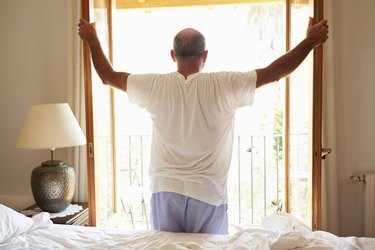
Heart rate is often used as an indicator of health and fitness. Athletes and fitness enthusiasts use heart rate monitors to measure the intensity of their workouts. Resting heart rate is used as a measure of cardiovascular fitness. Typically, the lower your resting heart rate, the more fit you are. However, heart rate is affected by many factors, including your body position.
Identification
Video of the Day
According to the American Heart Association, the best time to measure your resting heart rate is in the morning, before you get out of bed. The average resting heart rate is 60 to 80 beats per minute. Many factors affect heart rate, including activity level, emotions, medications, body position and size.
Video of the Day
Heart Rate Calculations
Heart rate monitors are a popular fitness tool to measure the intensity of your workout. To maintain or improve cardiorespiratory fitness, the American College of Sports Medicine recommends working out at 60 to 80 percent of your heart rate reserve. This figure is calculated using your resting heart rate so it is important to have an accurate number. If you measure your resting heart rate standing up versus lying down, the number may be 10 to 15 beats higher.
Body Position
When you stand up, blood flows to the lower extremities. This is partly due to the fact that blood flows to any muscle being worked and partly due to the effects of gravity. Lying down eliminates both these factors. When you are standing up, the heart has to work harder, against gravity, to get the blood pumped through the body and back to the heart. It beats faster to overcome the effects of gravity. Lying down neutralizes gravity, so your heart doesn't have to work as hard anymore. Your heart rate slows down.
Precautions
If you've ever stood up too quickly and felt light-headed, you've experienced what happens if your nervous system doesn't adjust properly to a different body position. Certain populations, especially the elderly, can fall or faint because the heart was unable to respond quickly enough, reducing the amount of blood to the brain. A faster heart rate when you stand is a necessary and useful response of the body.